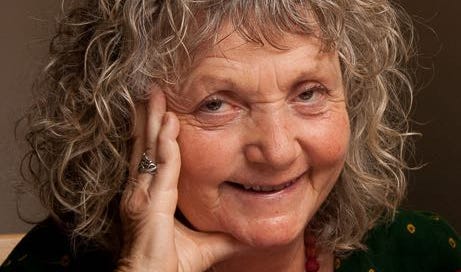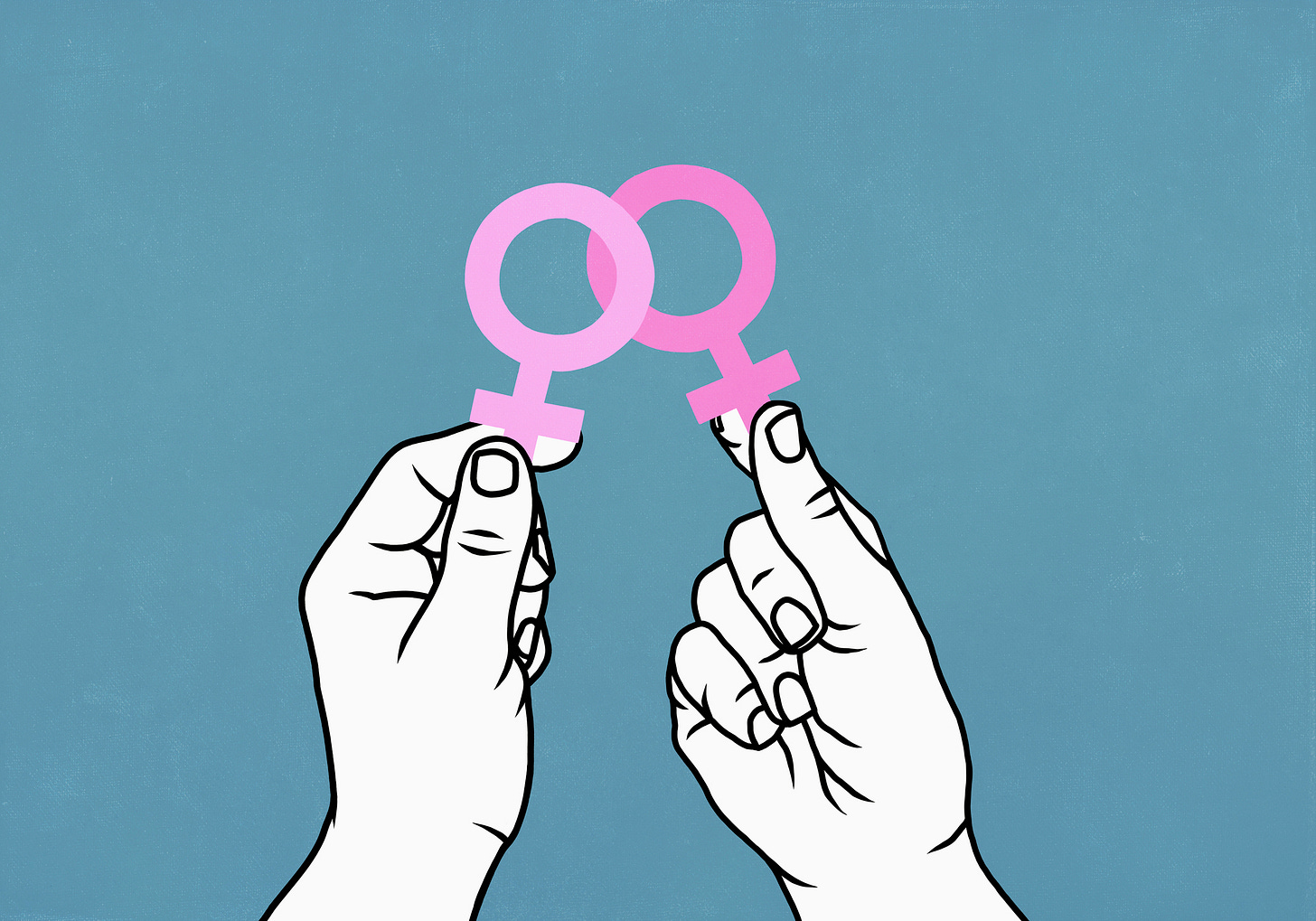The joy of choosing to become a lesbian
A guest post, by lesbian, feminist, author and publisher, Renate Klein
I asked my old friend and feminist comrade, Renate, to tell me more about why she chose to be a lesbian, in order to include her quotes in my forthcoming book, Lesbians: Where are we now? When she sent me this story I liked it so much asked her if I could guest post it on my Substack. Renate agreed, and so here it is!
Renate Klein
When I was about 17, my best girlfriend who was annoyed with me for some reason, yelled at me: “You are so stupid, you don’t even know what a lesbian is and that our headmistress is one.” It’s true, I did not know what a lesbian was. I can’t remember how I found out (a lexicon in my parents’ bookshelves?). But somehow I learnt that being a lesbian meant being a woman who has girlfriends. That didn’t bother me at all, I had always had lots of girlfriends. What did bother me a lot was when I learnt that our headmistress’ girlfriend was our horrible drawing teacher: a woman I could not stand (it was mutual). How could our nice headmistress have such bad taste?
I did know what a gay man was. My godfather was one and it was openly talked about. He was an artist and so was his boyfriend. My mother said being a gay artist was ok. Sadly, his boyfriend killed himself walking into a river with pockets full of stones. It was Easter and his death was explained as something to do with religion. I was very sorry for my godfather who had stopped smiling.
But anyway, knowing what a lesbian was had nothing to do with me. Like all my girlfriends I had boyfriends which at times came in handy: they carried my schoolbag, ran all sorts of errands and had books at home that my mother forbade me to read. When the time came, I got married like everyone else.
I had finished my MSc in Natural Sciences at Zurich University and was teaching biology and chemistry to high school students in 1975, when I saw an announcement of a talk at the university by Alice Schwarzer who was going to discuss her just published book Der kleine Unterschied und seine grossen Folgen (The small difference and its big consequences) which was about men’s violence against women. When I mentioned to my close group of friends that I was thinking of going, I was astounded by their unanimous response: “Why would you do that? Alice is stupid, she is a feminist. And she is really ugly and a lesbian.”
Not being one who likes to do what I am being told, I went to the talk on my own. I came away very impressed with book in hand: not only had Alice Schwarzer’s talk been really interesting, she was highly articulate, even entertaining and charming – and I found her rather good looking. I shared the good news with my friends, but from memory, they remained unimpressed. As a consequence of hearing Alice Schwarzer talk, I started to read the few books about feminism in German available at that time, Marielouise Janssen-Jurreit’s Sexismus (1976) among them.
I found what I read very interesting: the violence against women, all the inequalities, men’s dominance. But I shrugged it off; nothing to do with me who had such an equal relationship with my husband and was certainly not discriminated against.
That view changed rather rapidly when I found myself sitting in Garran (a suburb of Canberra in Australia) in 1977 where my husband had a one-year post-doc appointment at the University. And me? For the first time in my life, I was not treated as an intelligent independent human being: I was his ‘wife’ and relegated to the women’s corner in events after work where they talked about babies, a topic that I found incredibly boring. So, I re-read Sexismus (which for unexplained reasons I had brought with me from Switzerland) and had to admit to myself that boy oh boy Das Patriarchat (patriarchy) had a lot more to do with me than I had ever thought …
While this made me angry, it also made me determined that things had to change. As my clever husband had already secured himself another post-doc at plush Berkeley University near San Francisco, I gave myself three months to find something worthwhile to do, or else I would return to my teaching job in Switzerland.
With some chutzbah and a lot of luck, a month later I found myself happily ensconced in the Women’s Studies Program at Berkeley University where they needed a feminist biologist (me!). I was co-teaching the seminar Theories of Women’s Studies and, as I had discovered my ignorance about social sciences and humanities, had enrolled in a BA in Women’s Studies. I was happy as Larry, kept busy with teaching, studying and writing essays and becoming more of a radical feminist every day.
I was also meeting a lot of lesbians – half of Women’s Studies teachers and students fit into that category – and quite a few were in relationships. I found myself thinking more than once how good it would be to share one’s erotic attractions with one’s best feminist friend …
And then one of our students said to me that she had a crush on me! I panicked and told her, of course, nothing could come of this as I was the teacher, she the student … but what really annoyed me secretly was that I was not in the slightest attracted to this gorgeous woman with a big mop of black curls. I assumed, with a great deal of regret, that I must be hopelessly heterosexual. That made me sad.
A few weeks later, a friend convinced me to come with her to a party in downtown San Francisco on the weekend. It was a long drive and I had essays to finish but eventually I gave in and went with her. It was a beautiful hot summer evening.
When I entered the room, I immediately locked eyes with a woman standing opposite me. And then, before I knew what was happening, I felt this incredible tingling down my spine. Like moths attracted by light, we started moving towards each other. My life was about to change irrevocably and I couldn’t have been readier.
I didn’t drive back with my friend that night. Instead, I experienced the most perfect lovemaking possible. How could I have missed out on the intimate touch of a woman’s body for 33 years? It was ecstasy and gentleness combined.
The next day, as I was taking the BART train back to Berkeley, I couldn’t stop smiling. I wanted to shout from every rooftop so that the whole world could hear it: “I am a lesbian; my new life starts now.”
And, indeed, it did. The San Francisco fling did not last very long, but I never looked back. In 1981 when I moved to London to start working on my PhD, I defined myself as a lesbian radical feminist. The relationships kept coming … and going … bringing the most radiant of joy and the depth of sadness, but one thing was sure: all my lovers were the most interesting artsy and bookish types and all were of course feminists. Never a dull moment in our lives. Such a good change from my rather boring relationships with men. I never looked back: men were my past, women my future.
And, thus, it came that after I moved to Australia in 1986, I met my life partner Susan Hawthorne with whom I have now been together for 37 years. More than a life time during which we had so many great feminist adventures that it would be easy to fill a whole book with them. Over the years, our love and appreciation for each other has only increased and we both count ourselves incredibly lucky to be in each other’s life.
I shake my head when I hear people pontificating that same-sex attraction is genetic; I know the stories of hundreds of lesbians like us and in fact there are millions like us around the world. I don’t use the world ‘choice’ very often, but I do use it to describe how I became a lesbian. I CHOOSE to be a lesbian and that was the best decision of my life!
Renate Klein, Mission Beach, August 2024
Dr Renate Klein is a biologist and sociologist who was Associate Professor in Women’s Studies at Deakin University, Melbourne, Australia and a feminist health activist since the 1980s.
She is the (co)-author/editor of 20 books among them Not Dead Yet: Feminism, Passion and Women’s Liberation (edited with Susan Hawthorne) and Surrogacy: A Human Rights Violation.







I agree it's a choice to act on attraction to other women and pursue relationships with them, but having that attraction in the first place isn't a matter of choice. You either are a lesbian if you don't have any attraction to men, or a bisexual who chooses to only be with women: I've heard the term "feb" or "febfem" - female exclusive bisexual (feminist) - used to describe that and I think it's a useful term. Straight women don't have that same desire for women in the first place, and lesbians who have no desire for men still need a word to describe themselves.
That’s a fascinating recount of Renata’s ‘choice’ and I can see how, for her, it was a choice. For me, I am uncomfortable with the notion of choice about being a lesbian. The only ‘choice’ I recognise for me (and for so many others, I believe) is choosing to live my life as a lesbian, rather than remaining not only closeted but in denial in order to survive. Coming out for me was no big deal (and I know how lucky I am) once I knew that women like me existed and we had a name. I was a lesbian, no choice about that, but I chose to live openly as a lesbian, embracing all that was to follow (this was late 70s onwards - oh what fun we had in the 80s in the UK with section 28 etc..). So, I think I’m only comfortable with choice when I know what I am choosing between - this was never a choice between men or women, it was only ever going to be women.